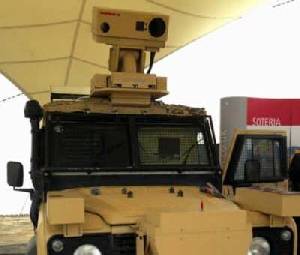
Raytheon UK has launched a new Stand-Off Improvised Explosive Device (IED) Detection and Confirmation Technology, known as Soteria, as a vehicle mounted system. The underlying technology has been developed in the UK alongside Laser Optical Engineering Ltd, a spin out company of Loughborough University.
Bob Delorge, chief executive of Raytheon UK, commented: "Soteria is a world leading technology that demonstrates the power of innovation that can be harnessed in the UK. The system can be applied to a wide range of scenarios including minefield clearance, which remains a significant menace in various world regions, as well as in other operations such as disaster relief."
Soteria utilizes innovative optical processing technology that gives the user an extremely high definition IED detection, confirmation and diagnosing capability, while exhibiting an extremely low false alarm rate. Soteria, from a significant stand-off distance, determines the shape, size, orientation and exact location of hidden IEDs and associated components. In the manned vehicle configuration, Soteria can confirm and diagnose threats from a safe distance to ensure maximum protection of troops and vehicles.
Raytheon UK's Soteria technology has been developed to counter the most sophisticated IEDs, and during comprehensive theatre simulated field trials was able to detect and classify the full array of explosive devices including those with low and zero metal content, which pose the biggest problems for current technologies such as ground penetrating radar. Being completely agnostic to target makeup, Soteria gives the flexibility to be used against new threats in future theatres of war.
Raytheon
17.07.2013